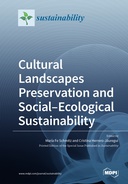Explore

Cultural Landscapes Preservation and Social–Ecological Sustainability
0 Ungluers have
Faved this Work
Login to Fave
Cultural landscapes are the result of social-ecological processes that have co-evolved throughout history, shaping high-value sustainable systems. The current processes of global change, such as agricultural intensification, rural abandonment, urban sprawl, and socio-economic dynamics, are threatening cultural landscapes worldwide. Whereas this loss is often unstoppable due to rapid and irreversible social-ecological changes, there are also examples where rationale protection measures can preserve cultural landscapes while promoting the sustainability of social-ecological systems. However, not all conservation policy-making processes consider the value of cultural landscapes, which makes their preservation even more difficult. Indeed, conservation policies focused on the wilderness paradigm are often counterproductive to conserving highly valuable cultural landscapes. The chapters in this book cover a wide spectrum of topics related to the preservation and sustainability of cultural landscapes, using different methodological approaches and involving regions from all over the world. This book can be useful for both researchers and professionals interested in using the socio-ecological framework in their scientific and applied work.
This book is included in DOAB.
Why read this book? Have your say.
You must be logged in to comment.
Rights Information
Are you the author or publisher of this work? If so, you can claim it as yours by registering as an Unglue.it rights holder.Downloads
This work has been downloaded 395 times via unglue.it ebook links.
- 395 - pdf (CC BY) at Unglue.it.
Keywords
- agricultural heritage
- alternative future assessments
- architectural strategies
- Biology, Life Sciences
- campsites
- Cape Verde
- co-design
- community planning
- conflicts
- Conservation
- cultural heritage
- cultural heritage garden
- Cultural Landscape
- cultural landscape corridor planning
- cultural landscapes
- Decolonization
- development preferences
- Ecological science, the Biosphere
- Ecotourism
- floristic composition
- folk nomenclature
- group modeling
- historic urban landscapes
- historical landscape
- ICT4F
- inside and outside protected areas
- integrated environmental management
- intensity of change
- Inuit
- Islands
- itinerant tourism
- IUCN’s Category V
- Land use
- landscape identity
- landscape planning
- landscape stability
- landscape structure
- Life sciences: general issues
- Linpan
- local heritage
- management effectiveness
- Mathematics & science
- Mediterranean tradition
- n/a
- Natural Landscape
- Participation
- participatory modeling
- Placetelling®
- Real Utopias
- Reference, information & interdisciplinary subjects
- Research & information: general
- riparian birds
- rurality loss
- scenario planning
- self-determination
- small-scale fisheries
- South Africa
- Spatial Analysis
- spatial heterogeneity
- spatial-temporal patterns
- stakeholder participation
- Surat’s heritage
- sustainability
- Sustainable development
- sustainable tourism
- systems thinking
- Technology
- thema EDItEUR::G Reference, Information and Interdisciplinary subjects::GP Research and information: general
- thema EDItEUR::P Mathematics and Science::PS Biology, life sciences
- thema EDItEUR::P Mathematics and Science::PS Biology, life sciences::PSA Life sciences: general issues::PSAF Ecological science, the Biosphere
- tokyo
- tourists’ preference
- Traditional knowledge
- traditional settlement
- urban heritage conservation
- urban planning
- urban planning and management
- urban rivers
- Value chains
- view factor
- Waterfowl
- wilderness
- wilderness discourse
Links
DOI: 10.3390/books978-3-0365-2570-9Editions

